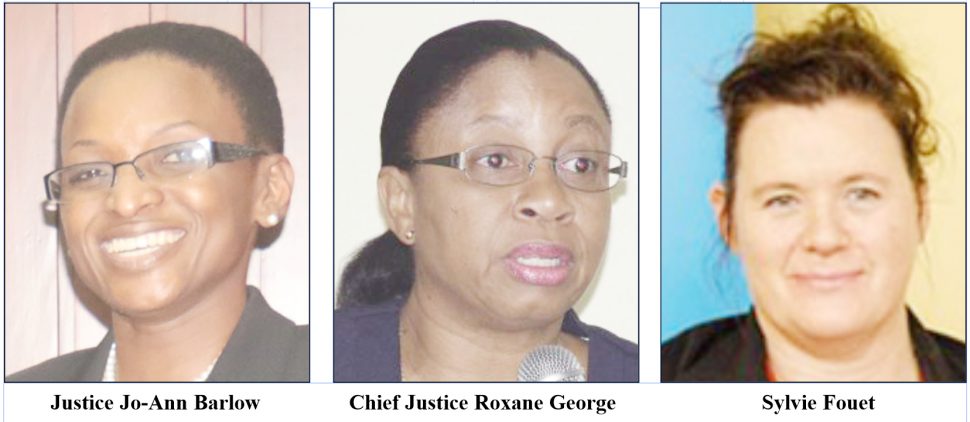UNICEF, in collaboration with the Judiciary, on Friday hosted a forum aimed at sensitising media operatives on the importance of providing fair, balanced and accurate reportage on domestic and sexual abuse cases.
Acting Chief Justice Roxane George-Wiltshire SC, in delivering brief remarks at the forum, said that as the fourth estate, the media has an important role to play in what can now be regarded as a digital era, where news and information is constantly instant.
Against this background, she said it becomes all the more important that there is fair and accurate, as well as sensitive reporting of sexual offences and domestic violence cases which fall into the category of gender-based violence.
Because of the personal nature of such cases, which carry with them traumatic consequences for both victims and their families (specifically highlighting where children may be involved), the Chief Justice said that responsible reporting is vital.
She further added that in this era where stories are uploaded online and can be on cloud forever, the possibility exists for even longer term trauma for persons, since such stories can be more easily retrieved and rehashed not only by journalists, but by “all and sundry,” whether for positive or negative reasons.
The Chief Justice said that responsible reporting is important because it raises public awareness about these issues and how they ought to be addressed.
She said it takes courage for victims to report such complaints and receive assistance without the fear of public embarrassment and ridicule and sensational reporting, which the media should shun. Responsible reporting she said, can go a long way in this regard.
Referencing what obtains in the United Kingdom (UK) as a model which can be adopted locally, Justice George-Wiltshire said that six tips for reporting are included in their guidelines and are centered on “accountability, accuracy, dignity, equality, ages and sensitivities” to different cultures and religions.
She said these guidelines advocate that responsibility be placed solely on the perpetrator, avoiding speculative reasons or triggers.
She also said it is urged that there be an end to sensationalist or trivialising language and that crime should be classed as domestic violence, instead of a tragedy or horror. The judge said it was importantly highlighted that these are crimes of control and not crimes of passion.
A good suggestion from the Non-Governmental Organisation (NGO), which advocated for the guidelines in the UK, the Chief Justice said, is that as in the case with suicide stories, information as to where help can be had should be included at the end of each story.
On this point, Justice George-Wiltshire suggested that the Guyana Press Association (GPA) take the initiative—if it has not yet done so—to partner with leading NGOs on gender-based violence, so as to set guidelines locally.
She said that this would act as a means of ensuring best practices in reporting and would contribute significantly to reducing, if not altogether ending the scourge of gender-based violence. While noting the media as part of a regional and global push in this regard, she stressed, “All heads and hands have to be on board.”
Speaking also at the forum was Justice Jo-Ann Barlow, who gave an overview of the Sexual Offences Act and the role to be played by all stakeholders and the media, which can be seen as a bridge between the courts and the wider community.
She said that media operatives who understand their obligations and responsibilities would be better able to execute their mandate.
Highlighting certain pertinent amendments to the Act, Justice Barlow explained that one measure in the equation of minimising trauma to survivors of sexual offences was the introduction of the paper committal procedure, which has taken away the need for the complainants having to tell his/her story in the Magistrate’s Court.
Having related that complaint to investigators and the fact that they would have to testify in the High Court, the judge explained that in order to stem the frequency with which the survivor would have to relive/retell such a traumatic story, the paper committal is done.
She expounded that by this process, a magistrate reviews the evidence in the case file, without anyone having to testify and would thereafter make a determination as to whether the defendant should be committed to stand trial before a judge and jury in the High Court, at which point testimonies would have to be given.
The judge said that geared towards protecting complainants from trauma, the specialist courts are now also outfitted with screens and one-way mirrors, which can be used in cases which so warrant, to ensure that there is no face-to-face contact with an accused person, which can be intimidating for complainants.
On this point, too, she explained that such considerations are also why matters of these natures are generally held to the exclusion of the press and public, except in certain circumstances where the law would so provide.
She said it is always important to balance the public’s right to know with that of the complainant’s privacy and dignity.
UNICEF country representative Sylvie Fouet, in her remarks, said that the organisation was pleased to be associated with an initiative such as this, and underscored the important role of the media in providing ethical reporting on domestic and sexual abuse cases.
She stressed that all stakeholders have an important role to play.
The forum was held at Parc Rayne, Lot 1 Rahaman’s Park, Houston, East Bank Demerara Georgetown.








